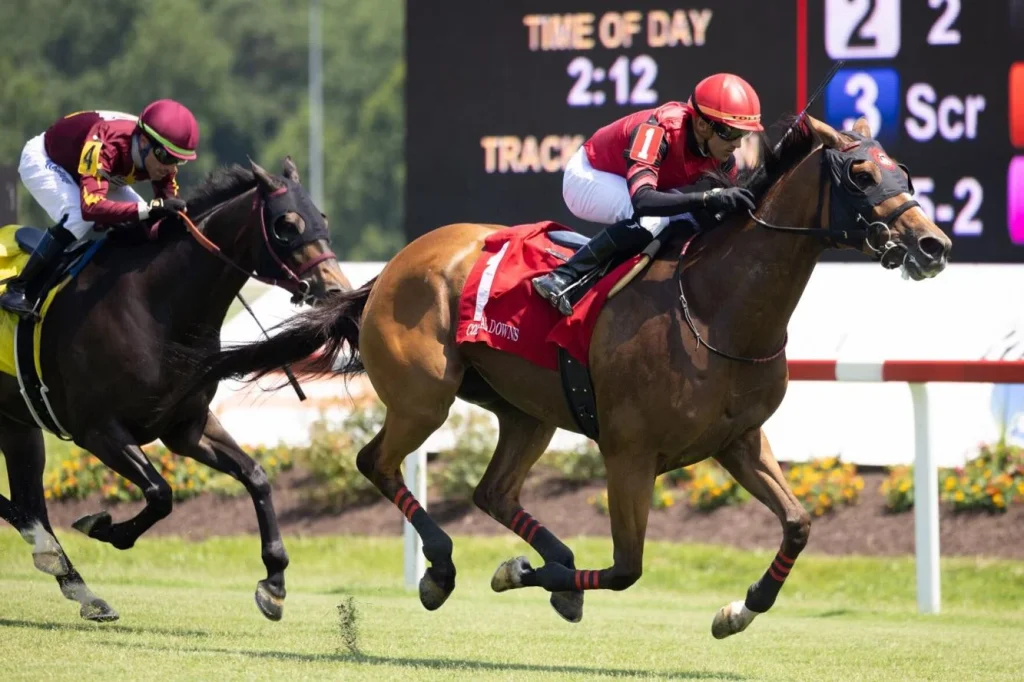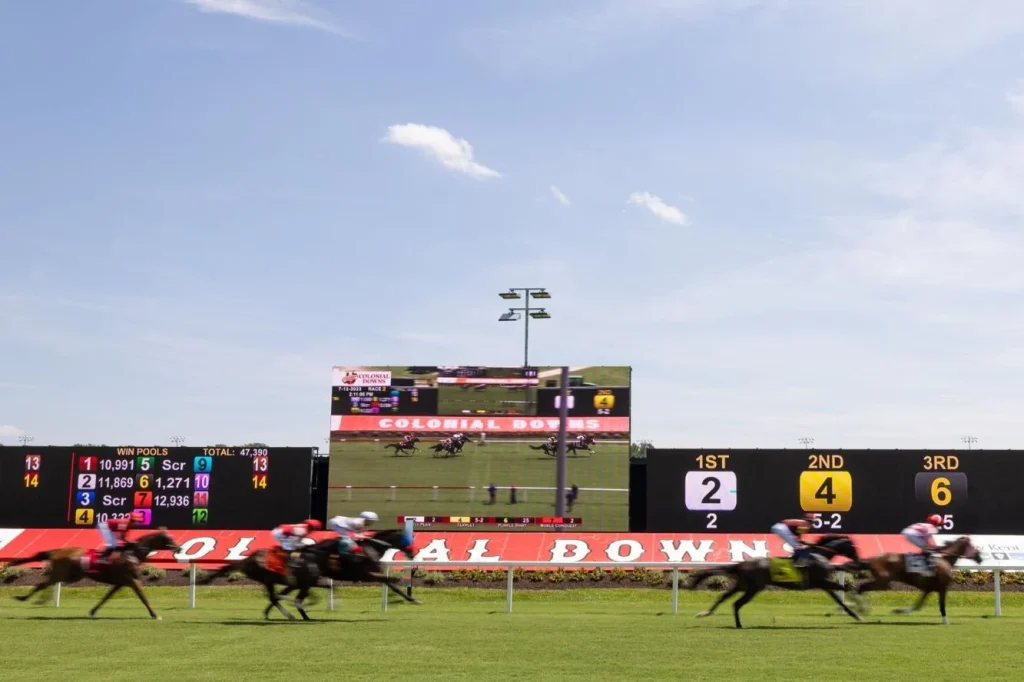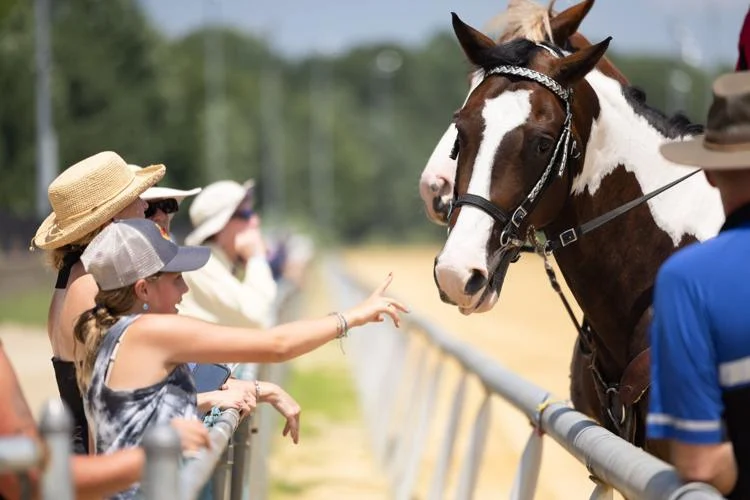The following appeared at richmond.com July 14 and was written by Savannah Reger. The Colonial Downs summer racing season continues through September 9 with cards scheduled every Thursday, Friday and Saturday at 1:30 PM
There’s a taste of the Kentucky Derby in New Kent County this year.
Bought by Louisville, Kentucky-based Churchill Downs Inc. in 2022, Colonial Downs track opened for the season Thursday and is set for nine weeks of horse racing. It’s the biggest year yet for the track, with three major races to be held: the Arlington Million, the Beverly D. Stakes and the Secretariat Stakes.
Usually these were held at Arlington Park in suburban Chicago, but that track has been sold.
In addition, the Beverly D. Stakes is a part of the Breeder’s Cup Challenge Series, earning the winner an automatic bid to the Breeders’ Cup Filly & Mare Turf in November.

Then, there’s the larger purses.
Frank Petramalo, the executive director of the Warrenton-based Virginia Horsemen’s Benevolent and Protective Association, said purses have grown exponentially over the past few years. The VHBPA represents owners and trainers who are licensed to race, and helps negotiate terms for them with the racetracks, Petramalo said.
So, with higher purses and more high-profile events taking place at the track, it has only increased Colonial Downs’ marquee value in the sport, he said.
“We hope to continue to grow,” he said.
So why did the purses go up?
“What really spurred expansion are those historical horse racing machines,” Petramalo said. “The purse money was generated by year-round wagering at off-track betting parlors. Online wagering has been growing over the years … so, our revenue came from that wagering as well as the off-track betting parlors.”


Rosie’s Gaming Emporiums were legalized in Virginia and opened a few years ago. Since then, a percentage of money goes toward purses. Now, Petramalo estimates that there could be up to 2,700 machines. By 2025, there could be around 5,000 machines.
27 days of racing in 2023
The shift comes as the horse racing industry faces continued financial pressure. Numerous tracks — from Hazel Park Raceway in suburban Detroit to Suffolk Downs near Boston — have shuttered over the past decade. Additionally, the industry has been marred by multiple horse deaths at such places as the iconic Santa Anita Park outside Los Angeles and at Churchill Downs in Louisville.
Colonial Downs opened in September 1997 on a parcel just off Interstate 64. Today, the once-rural area has seen an explosion of development, including new homes and businesses.
This year, there will be 27 days of horse racing. Petramalo said the goal is to ultimately reach 50 days because with every 100 machines, Colonial Downs has to have one day of racing.
With all the investment money that goes into owning a horse and training the horse, Petramalo said, venues with larger purses are attractive because it gives bettors a chance to make some money back, break even or even get ahead.
“The purses are your source of revenue if you win,” Petramalo said. “The high-publicity horses, you know, like the ones in the Kentucky Derby, they’re at the top. The rest of the horses kind of form the rest of the pyramid where they’re kind of the blue-collar workers.”
Mike Tomlinson, a horse trainer from Kentucky, is racing at Colonial Downs this year for the third time. Originally from Oklahoma, Tomlinson moved to Kentucky because it is where horse racing is solid and year-round.
Tomlinson has watched Colonial Downs grow more and more through his three years. He said he understands why the sport is dependent on money from bets, but it worries him to an extent.

“It’s a bit scary to me,” Tomlinson said. “It’s just going to keep growing. This is going to be the new home to the Arlington Million, which is a worldwide international race. So, you’re going to have people from all over the world run here. It’s going to be interesting to see how it progresses with the addition of more casinos.”
In addition to the bigger name races and purses this year, the race days are changing. Previously, race days were Monday-Wednesday, when it would have less competition against other tracks and be able to pull in more money, and then the weekends were reserved for more fan activities.
This year, races are Thursday-Saturday, all starting at 1:30 p.m. Tomlinson said Churchill Downs made the decision based on research. To him, it does not matter what three days his horses race.
Petramalo said he has mixed emotions about the change in race days, from a business and fan perspective. He is happy that the new race days are more convenient for fans even if Colonial Downs generated more money during the Monday-Wednesday stretch because they had the market to themselves.
“On Friday and Saturday, we’re competing with our friends in Maryland at Laurel but also competing with the big dogs in Monmouth, New Jersey, and Saratoga, New York,” Petramalo said. “Those are popular betting venues. When we were running on Thursday, Friday, Saturday, our daily average of wagering on our races was a little over a million dollars. Last year when we were running Monday, Tuesday, Wednesday, it was way over 2 million.”
‘We need to build the love of the horse’
Leanne Hester, a trainer at Colonial Downs who is from Virginia, is a fan of moving the race days. Hester, an advocate of taking children to the track, described racing as family-friendly.
“I’ve been here since the first year I had my kids and we were watching races,” Hester said. “It’s not just betting.”
Hester added that while betting is historic, it’s not what the races should be completely about. She said she understands its purpose and it’s not something to shy away from.
“[My family] and I were going to bet on some of the races,” Hester said. “We all picked our own horse, somebody behind me said, ‘You shouldn’t have kids at a racetrack like this.’ And I’ll never forget that because I’m like that should never be the perception. This is a family thing, you know, for all of us.”
The changes will be on display for the next nine weeks at Colonial Downs, including what is on track to be the biggest day in Virginia horse racing history Aug. 12, when the three big racing events mentioned earlier run.
“I’m a huge promoter to the public,” Hester said. “I want people to love racing, to love horses. It’s not all about sitting in front of a TV or a machine. We need to build the love of the horse.”

